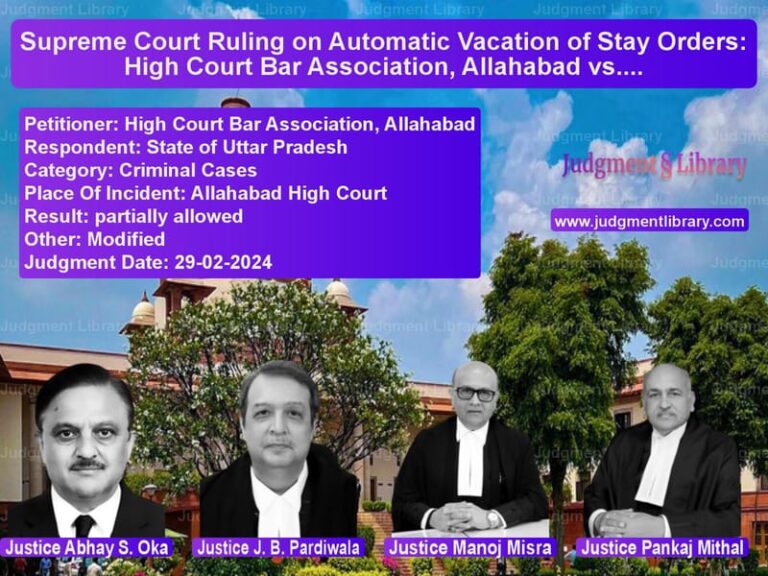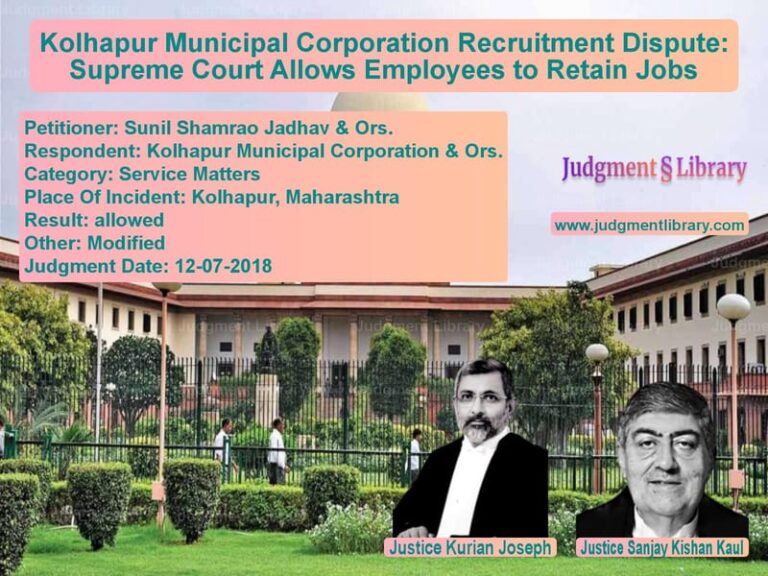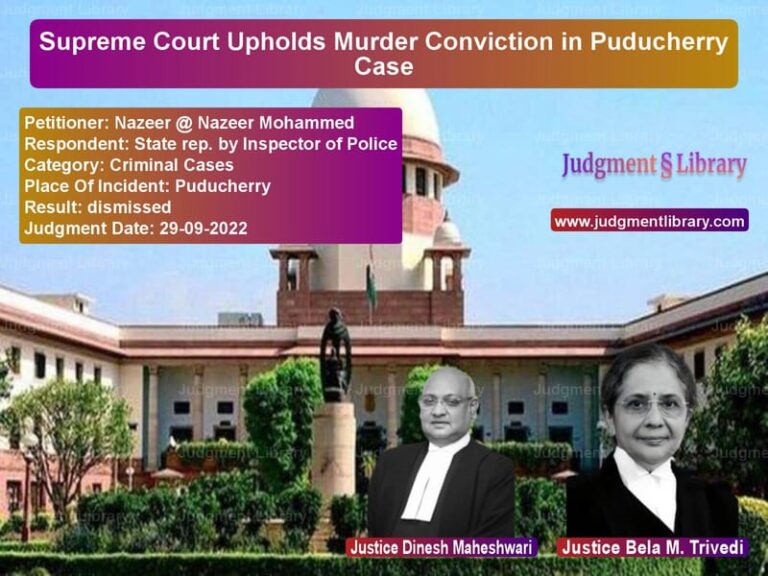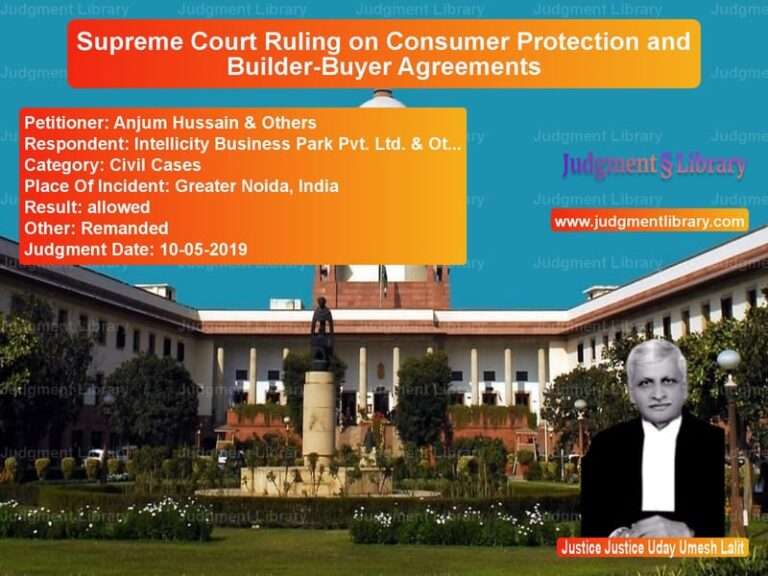Supreme Court Allows Impleadment of Transferee Pendente Lite in Land Dispute
The Supreme Court of India has delivered a crucial ruling in Yogesh Goyanka v. Govind & Ors., clarifying the rights of a transferee pendente lite in property disputes. The Court held that a subsequent purchaser who has acquired an interest in the property during litigation has the right to be impleaded in the underlying suit, provided there is a real possibility of collusion between the parties or a failure of the transferor to defend the case properly.
Background of the Case
The case originated from a dispute over a piece of agricultural land in Hindaun City, Rajasthan. The appellant, Yogesh Goyanka, along with other purchasers, acquired the disputed land through a registered sale deed on September 28, 2018. However, the land was already the subject of an ongoing lawsuit, where the plaintiffs (respondent nos. 1-17) had challenged the validity of the release deeds and a previous sale deed executed in 2007.
When the appellant learned of a temporary injunction issued in favor of the plaintiffs, he moved an application under Order 1 Rule 10 of the Code of Civil Procedure (CPC) to be impleaded as a party to the ongoing suit. The Additional District Judge (ADJ) rejected the application, citing that the appellant had purchased the property pendente lite (i.e., during litigation) and was not a bona fide purchaser. The Rajasthan High Court upheld the decision, leading the appellant to approach the Supreme Court.
Key Legal Issues Before the Supreme Court
- Whether a transferee pendente lite has the right to be impleaded in an ongoing property dispute.
- Whether the rejection of the impleadment application violated the principles of fair adjudication.
- Whether the doctrine of lis pendens under Section 52 of the Transfer of Property Act, 1882, barred the appellant’s claims.
Petitioner’s Arguments
The appellant, represented by Senior Counsel C.A. Sundaram, argued:
- He had acquired the land through a legally valid sale deed and was entitled to protect his interests.
- There was a strong possibility of collusion between the plaintiffs and the original defendants, as they were all relatives.
- The rejection of the impleadment application deprived him of the opportunity to defend his rights and subjected him to adverse orders without representation.
- The Supreme Court in Thomson Press v. Nanak Builders (2015) 5 SCC 397 had recognized the right of a transferee pendente lite to be impleaded in property disputes.
Respondent’s Arguments
The respondents, led by Senior Counsel V.K. Shukla, countered with the following arguments:
- The appellant was aware of the pending litigation before purchasing the land and, therefore, had no right to claim impleadment.
- The doctrine of lis pendens rendered the sale deed void against the plaintiffs’ claims.
- The appellant’s presence in the suit was unnecessary since the original seller was still a party to the litigation.
- Reliance was placed on Bibi Zubaida Khatoon v. Nabi Hassan Saheb (2004) 1 SCC 191, where the Supreme Court had ruled that transferees pendente lite do not have an automatic right to be impleaded.
Supreme Court’s Observations
The Supreme Court analyzed the legal provisions and precedent cases, making the following key observations:
1. Doctrine of Lis Pendens
The Court reaffirmed that Section 52 of the Transfer of Property Act does not render all transfers pendente lite void but makes them subject to the outcome of the pending litigation. It clarified that the doctrine does not prevent transferees from protecting their interests in court.
2. Right to Be Heard
The Court emphasized that a transferee pendente lite has a legitimate right to be heard in a dispute where their property rights are directly affected. It cited Amit Kumar Shaw v. Farida Khatoon (2005) 11 SCC 403 and A. Nawab John v. V.N. Subramaniyam (2012) 7 SCC 738, both of which allowed subsequent purchasers to be impleaded to avoid collusive litigation.
3. Possibility of Collusion
The Court noted that the plaintiffs and defendants were close relatives and that the suit was filed after a delay of over 11 years. It held that such circumstances raised legitimate concerns about collusion, justifying the appellant’s impleadment.
4. High Court’s Error
The Supreme Court found the High Court’s reasoning flawed, as it had treated the sale deed as automatically nullified due to lis pendens without considering the appellant’s right to defend his purchase.
Final Judgment
The Supreme Court ruled:
- The appellant’s impleadment application was wrongly dismissed by the High Court and the Additional District Judge.
- The doctrine of lis pendens does not bar a transferee pendente lite from being impleaded in an ongoing suit.
- The appeal was allowed, and the appellant was directed to be added as a defendant in the underlying suit.
Implications of the Judgment
This ruling sets a vital precedent for property disputes, reaffirming that transferees pendente lite have the right to defend their interests. It also ensures that procedural technicalities do not override the principles of natural justice.
The judgment provides clarity on how courts should handle impleadment applications in property disputes, striking a balance between preventing fraudulent transfers and protecting bona fide purchasers.
Petitioner Name: Yogesh Goyanka.Respondent Name: Govind & Ors..Judgment By: Justice Vikram Nath, Justice Satish Chandra Sharma.Place Of Incident: Hindaun City, Rajasthan.Judgment Date: 10-07-2024.
Don’t miss out on the full details! Download the complete judgment in PDF format below and gain valuable insights instantly!
Download Judgment: yogesh-goyanka-vs-govind-&-ors.-supreme-court-of-india-judgment-dated-10-07-2024.pdf
Directly Download Judgment: Directly download this Judgment
See all petitions in Property Disputes
See all petitions in Succession and Wills
See all petitions in Landlord-Tenant Disputes
See all petitions in Specific Performance
See all petitions in Contract Disputes
See all petitions in Judgment by Vikram Nath
See all petitions in Judgment by Satish Chandra Sharma
See all petitions in allowed
See all petitions in Quashed
See all petitions in supreme court of India judgments July 2024
See all petitions in 2024 judgments
See all posts in Civil Cases Category
See all allowed petitions in Civil Cases Category
See all Dismissed petitions in Civil Cases Category
See all partially allowed petitions in Civil Cases Category







